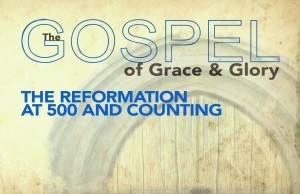Kevin DeYoung's Blog, page 22
August 31, 2017
Reformation Conference October 27-28, 2017
 Join us in celebrating the 500th anniversary of the Protestant Reformation on October 27-28 at Christ Covenant Church in Matthews, North Carolina. The conference, entitled "The Gospel of Grace & Glory: The Reformation at 500 and Counting,” is sponsored by Christ Covenant Church and Reformed Theological Seminary.
Join us in celebrating the 500th anniversary of the Protestant Reformation on October 27-28 at Christ Covenant Church in Matthews, North Carolina. The conference, entitled "The Gospel of Grace & Glory: The Reformation at 500 and Counting,” is sponsored by Christ Covenant Church and Reformed Theological Seminary.
Mike Kruger will lead the conference off by speaking on Friday evening at 7:00pm on Sola Scriptura. I will speak that same evening at 8:30pm on Sola Fide. We will hear from Keith Getty (Soli Deo Gloria), James Anderson (Sola Gratia) and Blair Smith (Solus Christus) on Saturday. There are also breakout sessions on Saturday morning with Bill Barcley (on worship), Don Fortson (on William Tyndale) and Brian Peterson (on the church).
The conference is $25/person ($50/family) with financial assistance available. More information, including how to register, is available here.
Although the conference is technically only Friday and Saturday, we also have special events planned (for free) on Sunday, October 29. I will be teaching a combined Sunday school class on "Ad Fontes: The Reformation Slogan We Never Hear About." Mike Kruger will lead our morning worship service at 10:45am, preaching from Matthew 21:28-32. We will end the weekend with a 7:00pm concert featuring Keith and Kristyn Getty. No tickets are required, but an offering will be taken to defray the cost of the event.
If you are anywhere near Charlotte at the end of October, we hope that you will consider joining us for this special Reformation weekend.
August 28, 2017
What a Worship Director Loves
 Our talented, godly, and beloved director of worship recently announced he is taking a call to serve another PCA congregation. So we are in the unenviable position of trying to find another man who will be as talented and godly and beloved.
Our talented, godly, and beloved director of worship recently announced he is taking a call to serve another PCA congregation. So we are in the unenviable position of trying to find another man who will be as talented and godly and beloved.
Which got me thinking about what a worship director loves. It’s probably a given that he loves music, and that he is, on some level (depending on the congregation), a proficient singer, instrumentalists, conductor, and arranger. But the best worship directors love worship more than they love music. The body of Christ doesn’t need exquisite musicians who happen to find church work as much as they need committed churchmen and godly worshipers gifted in music.
In other words, in addition to having the necessary musical chops, the church’s director of worship (or music minister or worship pastor or whatever) must be marked by a number of other loves.
1. He loves the Bible. He studies the Bible, is thrilled with the Bible, and tests everything against the Bible.
2. He loves the sound of the congregation singing. Although he may bless the congregation with large musical numbers, top notch productions, and original compositions, what he most enjoys is supporting the people of God in voicing their adoration, confession, and thanksgiving.
3. He loves the forms and the liturgy of the historic, Reformed tradition (at least this one is true where I’m coming from). He is gladly committed to Reformed theology, traditional Presbyterian worship, and the best of evangelical hymnody.
4. He loves to hear Jesus praised in a variety of styles and genres. While rooted in a particular tradition, he does not look down on the best stuff from other traditions and get persnickety about selections from outside his own preferred musical style.
5. He loves Lord's Day worship. Of all the productions or performances he may skillfully arrange and conduct, he is most passionate about the weekly worship of the saints Sunday after Sunday.
6. He loves to pastor musicians, choir members, and his support staff. He treats people as people in need of encouragement, support, and discipleship, not as means to a musical end.
7. He loves theological integrity. Beauty does not bypass truth, but is enhanced by careful attention to it. He will be theologically "fussy" even more than he is musically "fussy."
8. He loves to be part of a team. He gladly embraces the demands and opportunities of working in a church with many volunteers, an excellent support staff, and a large staff.
9. He loves good preaching. He knows that he needs the word, and he thrills to hear it proclaimed each week.
10. He loves to come alongside and serve the Senior Pastor. His personal interactions with those in authority are marked by humility, grace, and an easy going affability.
Do such men exist? Yes, I’ve seen them. And they are a gift to the church. May their tribe increase in the decades ahead. And may God bless those committed to training the next generation of musically talented, theological careful, and personally affable worship leaders.
P.S. I realize that there is much more to worship than the music, and that Jesus is ultimately our worship leader. I am using these familiar terms in ways that people can understand them.
August 21, 2017
One More Time on ‘Game of Thrones’
 I don’t understand Christians watching Game of Thrones. That’s what I said two weeks ago. And a bazillion blog and Facebook comments later, I still don’t understand.
I don’t understand Christians watching Game of Thrones. That’s what I said two weeks ago. And a bazillion blog and Facebook comments later, I still don’t understand.
This seems like an important-enough issue--not the show itself, but the larger principle at stake--that I thought a follow-up post might be helpful. Let me zip through a number of common criticisms and then finish with one salient point.
1. You haven’t even seen the show! True, but no one has tried to refute that Game of Thrones is full of graphic sex scenes. The facts of the matter aren’t in dispute.
2. Don’t like it? Then don’t watch it! That would be a fine point if the argument only concerned taste and preference. But what would you say if your son tried that line in defense of his pornography?
3. The Bible is full of sex and violence. This is a popular retort, though hardly persuasive. No one is arguing that reading about sin, or even, in every case, watching sin, is necessarily sinful. But there is a world of difference between a terse description of sin (David lay with Bathsheba), a metaphor-laden poem about romantic love (Song of Songs), or a chapter about the ugliness of spiritual adultery (Ezekiel 16) and watching two naked people pretend to have sex. There’s a reason the Bible speaks of the lusts of the eyes. Hollywood skin and Hollywood sex are meant to arouse. That’s the aim. That’s part of the attraction. By contrast, the Bible never aims toward unholy arousal--exactly the opposite. The most explicit sexual book in the Bible celebrates the pleasures of married love with metaphorical language designed not to encourage voyeurism but to appreciate the beauty of what God created for one man and one woman.
4. Sex scenes and nudity don’t phase me. No doubt, people are wired differently, but I question whether the folks who say this know themselves as well as they think they do. And if looking upon what God has forbidden has no effect on us, that’s not a good sign.
5. My conscience isn’t bothered. The conscience can misfire (Heb. 10:22). We may not feel conviction for sin where we should (1 Tim. 4:2). God covered Adam and Eve’s nakedness (Gen. 3:21). Job made a covenant with his eyes (Job 31:1). And Christians are commanded to dress modestly (1 Peter 3:3-4). Sex scenes should bother us.
6. Stop judging and shaming! Judgmentalism is a spirit of censorious nitpicking. Making moral evaluations is what Christians do all the time, like arguing that a television show is not appropriate or that a blog post is judgmental.
7. I close my eyes during the bad parts. Better than nothing, I suppose. But how reliable really is squinting and peaking to see when the bad stuff if over? And how important is it to watch HBO that we must go to these lengths to get in on the action? Some mentioned that they use VidAngel to cut out the bad parts. That’s a better option.
8. Most shows have good and bad elements. The story and artistry outweigh these bad scenes. But everyone agrees (I hope) that some elements are so bad that the good stuff is not worth it. Like picking up Playboy for the articles. Or thumbing through the Sports Illustrated swimsuit issue to enjoy the pretty beaches. Granted, Game of Thrones is a more impressive piece of art (from what I’ve heard) than these blatant attempts at sexual stimulation. But then again, from what I’ve heard, the sex scenes in Game of Thrones are pretty blatant too.
9. I watch the show to engage my co-workers with the gospel. I’m willing to bet that the number of unbelievers coming to Christ through Game of Thrones chatter is quite low. Perhaps we could get to the gospel more quickly in gently explaining why we don’t watch the show.
10. Don’t we have more important things to worry about? Of all the bad social media arguments, Whataboutism is one of the worst. There are always a thousand other important issues we could be addressing. But then again, there are also a thousand other important things we could be doing rather than watching graphic sex scenes on television.
Heart of the Matter
The problem with these rebuttals is that most of them make an implicit assumption; namely, that immersing ourselves in sensual entertainment is somehow a gray area of Christian liberty. It isn’t.
Which leads to my one salient point: I’ve not come across a single, compelling argument for the legitimacy of Christians viewing graphic sex scenes.
From Adam and Eve scrambling for fig leaves (Gen. 3:10), to the dishonorable nakedness of Noah (Gen. 9:21), to the embarrassingly exposed buttocks of David's men (2 Sam. 10:4), the Bible knows we inhabit a fallen world in which certain aspects of our bodily selves are meant to be hidden. Indeed, this is precisely what Paul presumes when he speaks of "our unpresentable parts" which must be "treated with greater modesty" (1 Cor. 12:23). There's a reason Momma called them private parts. Outside of marriage, we aren’t mean to show them, and we aren’t meant to see them.
Does anyone actually think the apostle Paul (or any other apostle, or Jesus for that matter) would have been cool with the sensuality prevalent in Game of Thrones (and so much of our entertainment)? We are not talking about marble statues or a Holocaust documentary or a physician examining a patient. We are talking about two naked people doing in front of us what naked people do together. Take the medium of television out of it. Would you go into a private room and look through a peep hole to watch this? Would anyone think that’s the sort of thing we can give thanks for? Or the sort of thing mature Christians do?
If there are serious Christians reading this blog who really feel okay with viewing graphic nudity and sex, I humbly challenge you to take a week and pray every day, asking God if you are listening to the Spirit and reading the Word correctly on this matter. Better yet, take a month to pray, and during that month do a detox of anything that could possibly be construed as sexually explicit or provocative. You may see with new eyes what you are too comfortable seeing at the moment. You may even discern a nagging conviction of sin that you’ve been pushing aside as nothing but religious baggage. And in coming to grips with our casual approach to sexual sin, could it be you are missing out on grace, forgiveness, and the purity of heart that is blessed to see the Lord (Matt. 5:8).
On occasion I’ve stumbled upon a few minutes of PG-13 movies I used to enjoy as a teenager (like the Naked Gun series). I’m appalled by the things that didn’t tweak my conscience then but do now. We are so awash in sensuality that many Christians have no idea how compromised they’ve become. I’m not on a crusade to banish one particular TV show. The show itself is not the point. But as long as I am still considered somewhat “young” and “current,” I want to do all I can to ring the bell for holiness and sound the alarm against all the high places we don’t even recognize. Only in a hyper-sexual, pornographic-saturated culture like ours could we think that graphic sex scenes are no big deal, or somehow offset by a brilliant screenplay. I cannot imagine how anyone growing closer to the God of the Bible will want to see more sex and nudity, or that anyone has found shows like Game of Thrones to be a serious blessing in seeing and savoring Christ. We become what we behold. So let’s be careful little eyes what we see.
One More Time on Game of Thrones
 I don’t understand Christians watching Game of Thrones. That’s what I said two weeks ago. And a bazillion blog and Facebook comments later, I still don’t understand.
I don’t understand Christians watching Game of Thrones. That’s what I said two weeks ago. And a bazillion blog and Facebook comments later, I still don’t understand.
This seems like an important enough issue–not the show itself, but the larger principle at stake–that I thought a follow up post might be helpful. Let me zip through a number of common criticisms and then finish with one salient point.
1. You haven’t even seen the show! True, but no one has tried to refute that Game of Thrones is full of graphic sex scenes. The facts of the matter aren’t in dispute.
2. Don’t like it? Then don’t watch it! That would be a fine point if the argument only concerned taste and preference. But what would you say if your son tried that line in defense of his pornography?
3. The Bible is full of sex and violence. This is a popular retort, though hardly persuasive. No one is arguing that reading about sin, or even, in every case, watching sin, is necessarily sinful. But there is a world of difference between a terse description of sin (David lay with Bathsheba), a metaphor-laden poem about romantic love (Song of Songs), or a chapter about the ugliness of spiritual adultery (Ezekiel 16) and watching two naked people pretend to have sex. There’s a reason the Bible speaks of the lusts of the eyes. Hollywood skin and Hollywood sex are meant to arouse. That’s the aim. That’s part of the attraction. By contrast, the Bible never aims toward unholy arousal–exactly the opposite. The most explicit sexual book in the Bible celebrates the pleasures of married love with metaphorical language that is designed not to encourage voyeurism but to appreciate the beauty of a what God created for one man and one woman.
4. Sex scenes and nudity don’t phase me. No doubt, people are wired differently, but I question whether the folks who says this know themselves as well as they think. And if looking upon what God has forbidden has no effect on us, that’s not a good sign.
5. My conscience isn’t bothered. The conscience can misfire (Heb. 10:22). We may not feel conviction for sin where we should (1 Tim. 4:2). God covered Adam and Eve’s nakedness (Gen. 3:21). Job made a covenant with his eyes (Job 31:1). And Christians are commanded to dress modestly (1 Peter 3:3-4). Sex scenes should bother us.
6. Stop judging and shaming! Judgmentalism is a spirit of censorious nitpicking. Making moral evaluations is what Christians do all the time, like arguing that a television show is not appropriate or that a blog post is judgmental.
7. I close my eyes during the bad parts. Better than nothing, I suppose. But how reliable really is squinting and peaking to see when the bad stuff if over? And how important is it to watch HBO that we must go to these lengths to get in on the action? Someone mentioned that they use VidAngel to cut out the bad parts. That’s a better option.
8. Most shows have good and bad elements. The story and artistry outweigh these bad scenes. But everyone agrees (I hope) that some elements are so bad that the good stuff is not worth it. Like picking up Playboy for the articles. Or thumbing through the Sports Illustrated swimsuit issue to enjoy the pretty beaches. Granted, Game of Thrones is a more impressive piece of art (from what I’ve heard) than these blatant attempts at sexual stimulation. But then again, from what I’ve heard, the sex scenes in Game of Thrones are pretty blatant too.
9. I watch the show to engage my co-workers with the gospel. I’m willing to bet that the number of unbelievers coming to Christ through Game of Thrones chatter is quite low. Perhaps we could get to the gospel more quickly in gently explaining why we don’t watch the show.
10. Don’t we have more important things to worry about? Of all the bad social media arguments, Whataboutism is one of the worst. There are always a thousand other important issues we could be addressing. But then again, there are also a thousand other important things we could be doing rather than watching graphic sex scenes on television.
The Heart of the Matter
The problem with these rebuttals is that most of them make an implicit assumption; namely, that immersing ourselves in sensual entertainment is somehow a gray area of Christian liberty. It isn’t.
Which leads to my one salient point: I’ve not come across a single, compelling argument for the legitimacy of Christians viewing graphic sex scenes.
From Adam and Eve scrambling for fig leaves (Gen. 3:10), to the dishonorable nakedness of Noah (Gen. 9:21), to the embarrassingly exposed buttocks of David's men (2 Sam. 10:4), the Bible knows we inhabit a fallen world in which certain aspects of our bodily selves are meant to be hidden. Indeed, this is precisely what Paul presumes when he speaks of "our unpresentable parts" which must be "treated with greater modesty" (1 Cor. 12:23). There's a reason Momma called them private parts. Outside of marriage, we aren’t mean to show them, and we aren’t meant to see them.
Does anyone actually think the Apostle Paul (or any other Apostle, or Jesus for that matter) would have been cool with the sensuality that is prevalent in Game of Thrones (and so much of our entertainment)? We are not talking about marble statues or a Holocaust documentary or a physician examining a patient. We are talking about two naked people doing in front of us what naked people do together. Take the medium of television out of it. Would you go into a private room and look through a peep hole to watch this? Would anyone think that’s the sort of thing we can give thanks for? Or the sort of thing mature Christians do?
If there are serious Christians reading this blog who really feel okay with viewing graphic nudity and sex, I humbly challenge you to take a week and pray every day, asking God if you are listening to the Spirit and reading the word correctly on this matter. Better yet, take a month to pray, and during that month do a detox of anything that could possibly be construed as sexually explicit or provocative. You may see with new eyes what you are too comfortable seeing at the moment. You may even realize there has been a nagging conviction of sin that you’ve been pushing aside as nothing but religious baggage. And in coming to grips with our casual approach to sexual sin, could it be you are missing out on grace, forgiveness, and the purity of heart that is blessed to see the Lord (Matt. 5:8).
On occasion I’ve stumbled upon a few minutes of PG-13 movies I used to enjoy as a teenager (like the Naked Gun series). I’m appalled by the things that didn’t tweak my conscience then but do now. We are so awash in sensuality that many Christians have no idea how compromised they’ve become. I’m not on a crusade to banish one particular TV show. The show itself is not the point. But as long as I am still considered somewhat “young” and “current,” I want to do all I can to ring the bell for holiness and sound the alarm against all the high places we don’t even recognize. Only in a hyper-sexual, pornographic-saturated culture like ours could we think that graphic sex scenes are no big deal, or somehow offset by a brilliant screenplay. I cannot imagine how anyone growing closer to the God of the Bible will want to see more sex and nudity, or that anyone has found shows like Game of Thrones to be a serious blessing in seeing and savoring Christ. We become what we behold. So let’s be careful little eyes what we see.
August 20, 2017
Monday Morning Humor
August 18, 2017
A Word for Imperfect, But Persistent Pastors
John Calvin, in dedicating his Commentary on John (1553) to the Syndics and Council of Geneva:
Farther, as I freely acknowledge before the world that I am very far from possessing the careful diligence and the other virtues which the greatness and excellence of the office requires in a good Pastor, and as I continually bewail before God the numerous sins which obstruct my progress, so I venture to declare that I am not without an honest and sincere desire to perform my duty.
There’s a sentence most pastors feel much of the time, especially with Sunday coming. Lord, help us, we’re trying.
August 15, 2017
It Wasn’t That Long Ago
 Do we need really need one more hot take on Charlottesville?
Do we need really need one more hot take on Charlottesville?
Racism is wrong. White supremacy is sinful. Murder (by car, or by any other means) is deplorable. The whole scene was ugly. The pictures of Tiki torches and Nazi salutes would be silly, were they not so sinister.
Beyond those obvious sentiments (or, at least what I used to assume were obvious sentiments–as I said yesterday on Twitter, “Racial reconciliation is complicated and hard. Condemning Neo-Nazis should not be.”), what else should be said?
Here is one simple observation–an observation that until recently I would have missed.
Let’s start by setting aside the debate about how bad things really are. Do the hundreds of Neo-Confederate and Neo-Nazis gathered in Charlottesville represent a teeny-tiny, overly hyped segment of the American popular? Or are we seeing the tip of the iceberg as White Nationalism is now feeling freer to come out of the closet? Or is there truth to both statements? I think most Christians would grant that real strides have been made over the last fifty years when it comes to equal treatments for African Americans, while at the same time acknowledging that we haven’t made as much progress as we would like. The degree to which things are “not that bad” or things “are as bad they’ve ever been” is not the debate I want to have here.
But even if we conclude that the vast majority of Americans despise racism and have zero sympathy for fools infatuated with Hitler, it would still be the case that what we saw in Charlottesville was, for a long time, not that unusual. I have a lot still to learn when it comes to understanding racial matters in our country. But one of the things I have learned is that I haven’t fully appreciated how recent this history really is.
This came to my attention a couple years ago when I was reading David Kennedy’s book Don’t Shoot. In this fascinating book–part memoir and part policy prescription–Kennedy strikes the remarkable the balance of being sympathetic to African American communities and sympathetic to police officers. But I don’t bring up the book to talk about law enforcement, but to note what he says about historical legacy.
Here’s what I wrote last year:
"Let's start with the fact," Kennedy begins, "that the idea, common currency in these neighborhoods, that the government is running a carefully organized racial conspiracy [e.g., introducing crack into the inner city so that blacks can be arrested and whites can have good jobs in jails and in police departments] against black America is not as crazy as it sounds" (140). We have to remember that it wasn't that long ago that Jim Crow and separate but equal were legal, and even more recent that all sorts of illegal injustices (like lynchings) were overlooked by law enforcement agencies in cahoots with the KKK. "This was America, our America. Whites tend barely to know it, or to diminish it, or to set it aside as then against whatever it is that now begins." (141). But in living memory for many in the black community, and in the collective memory of many more, are remembrances of police dogs and fire hoses set against peaceful demonstrators, of Bloody Sunday, of Klan-directed terrorism, of real racial injustices in our judicial system that most of us would find cringe-worthy and cruel. This may all seem like a long time ago, but not when it happened to your grandma or to your pastor.
Even though I wrote this paragraph, I can easily forget it. I can think, “We’ve moved past the worst of these problems.” An by some measures we certainly have. But the events of this weekend demonstrate that the past can still be scarily present. It also reminds me that what is an ugly news story to me as a white man is going to land on my African American brothers and sisters with a frightening force that I’ve not had to face.
So no matter how far we’ve come, or how loudly we denounce racism, we have to realize that the pride of racial superiority is still sin and it’s still with us. Even on our best days–as a country, as the church, and as individuals–it’s still the case that the worst days weren’t that long ago. For some, they were just last weekend.
August 10, 2017
The Biggest Story ABC
 I love how the book turned out. The size is bigger than a lot of toddler board books. The design is sturdy and attractive. And of course, Don Clark’s illustration are beautiful.
I love how the book turned out. The size is bigger than a lot of toddler board books. The design is sturdy and attractive. And of course, Don Clark’s illustration are beautiful.
Here’s the write-up from Crossway:
From Adam and Eve in the garden of Eden to Zion and the new creation world, the Bible is telling one big story--the story of God’s promise to deliver his people. Kevin DeYoung, best-selling author of The Biggest Story, has written a new board book to help kids ages 1 to 3 to make connections from Genesis to Revelation and from A to Z. Each page introduces a new letter of the alphabet with engaging and whimsical illustrations from award-winning artist Don Clark, retelling the biblical narrative in one continuous story. This board book is a fun way for parents to introduce their small children to the big story of the Bible.
The Biggest Story ABC is available from WTS Books and Amazon.
August 7, 2017
I Don’t Understand Christians Watching Game of Thrones
 This will not be a long post. Because the issue doesn’t seem all that complicated.
This will not be a long post. Because the issue doesn’t seem all that complicated.
I don’t understand Christians watching Game of Thrones.
Whenever there is a new episode, my Twitter feed overflows with people talking about Game of Thrones. First off, I’m always amazed that this many people have HBO. But second, and much more importantly, I’m always amazed that a number of people I respect–smart people, serious Christians, good conservative thinkers–are obviously watching (and loving) the series.
True, I haven’t seen it. Not an episode. Not a scene. I hardly know anything about the show. I know many people consider it absolutely riveting–full of compelling characters, an engrossing story, and excellent acting, writing, and aesthetics.
But isn’t it also full of sex? Like lots and lots of incredibly graphic sex? I did a Google search for “Game of Thrones sex” and found headlines (I avoided images and only read headlines) about sex scenes you can’t un-see and the best sex scenes of the series and why Game of Thrones is so committed to nudity and explicit (sometimes violent) sex. Unless I’m mistaken, the series hasn’t taken a turn toward modesty in recent months. It seems to me sensuality–of a very graphic nature–is a major part of the series. And still, a good number of conservative Christians treat the series as must-see TV.
I don’t get it.
I won’t repeat what John Piper has already written. His twelve questions are well worth asking, not only for this show, but for all our entertainment choices. I just want to ask one other question: does anyone really think that when Jesus warned against looking at a woman lustfully (Matt. 5:27), or when Paul told us to avoid every hint of sexual immorality and not even to speak of the things the world does in secret (Eph. 4:3-12), that somehow this meant, go ahead and watch naked men and women have (or pretend to have) sex?
I know some people will say it doesn’t bother their conscience or that it’s art or they can view sinful sex without participating in it themselves. But that doesn’t change what the Bible says about the importance of purity and the power of the eye. The fact is our consciences should be smitten; steamy sex scenes are not the kind of art for which we can give thanks; and it’s hard to imagine Paul would have been cool with the believers in Ephesus watching simulated sex for a fee each month, so long as they don’t hook up in real life.
I don’t expect those who are strangers to the light to be bothered by the darkness. But for conservative Christians who care about marriage and immorality and decency in so many other areas, it is baffling that Game of Thrones gets a free pass. “Look carefully then how you walk,” is God’s word to all of us, “not as unwise but as wise, making the best use of the time, because the days are evil” (Eph. 5:15-16).
August 1, 2017
Why I’m Not Allowing Laptops in My Seminary Class
 I am teaching my first class as a seminary professor this October. I’m sure I’ve already made one unpopular decision.
I am teaching my first class as a seminary professor this October. I’m sure I’ve already made one unpopular decision.
I am not allowing laptops (or tablets or phones for that matter).
I know there is a case to be made for allowing computers into the classroom. Students can type faster than they can write by hand. Digital notes can be accessed across multiple devices. It’s easier to edit notes electronically. Our hands will cramp up. We won’t be able to read our own writing. The lead on the pencil will break. I’m sure there are more sophisticated reasons too. I don’t judge the thousands of teachers who allow, or even encourage, computer use in the classroom. I know my position is a minority one.
But here’s my thinking:
1. I wasn’t a student all that long ago, and I know what I did on my laptop. No, nothing sinister. I was a good student who worked hard and paid attention. But I also took my computer to multitask. And this was before easy access to the internet. All I had were a few games and my other assignments to keep me busy, but I still found ways to be distracted. How can an hour of lecture possibly compete with catching up on email, texting with a friend, and getting the latest “breaking news” from Twitter and Facebook? Will students daydream and doodle and draft other compositions even without a laptop? Of course. But at least they won’t have the world at their fingertips and world-class entertainment a minimized screen away.
2. The studies that suggest students are better off without a laptop in the classroom ring true to me. Taking notes by hand forces students to slow down, be more selective, and integrate what they’re learning. And students aren’t just sneaking a peak at other things here or there. They are spending more than half their time texting friends and using their computers for nonacademic purposes. Even smart students learn less because they love to multitask and accomplish as much as possible.
3. We all could use a break from the ubiquitous pull of technology. Seriously, I’m probably as addicted to my devices as my students are. So why create (let alone encourage) another venue where we can be tethered to the screen? Wouldn’t a little device detox do us all a little good?
And that leads us to the heart of the matter. Suppose we could really be sure that students would be absolutely true to their word, and they would never get on the internet and never toggle to another assignment and never chip away at solitaire. Suppose a self-policing policy actually worked (as you hope it would in seminary of all places). For pedagogical reasons I would still be against laptops. I don’t want students glued to the screen. I’m not trying to get the students to guess what my lecture notes look like. I’m not trying to test their note-taking abilities by quizzing them on the most obscure bits of every lecture. I am not aiming to develop court stenographers. If the goal is to produce an exact replica of my notes, I can give them my notes! But I want them engaged with me. I want eyeballs. I want ears. Can I be so bold as to say, I even want hearts.
It may be the case that some professors are dry as toast and do nothing more than read old conference papers or plow through too much material with no mercy on finite brains (or finite bladders). That’s an output problem and not one that an input device is going to solve. I want my lectures to be interesting. I want them to be edifying. Forgive me for sounding like Robin Williams in Dead Poets Society, but I want them to be inspiring. And that means I don’t want to see 30 illuminated Apple logos. I want people to be thinking and feeling and ruminating and wrestling as I speak, not staring at a screen trying to type every word I say.
Which means I want students to do more than leave their laptops at home. I want them to approach the lecture as a listening-digesting-pondering event. I may not be good enough to pull this off, but I’d love for students to come to the conclusion, paradoxical as it may sound, “This material is too good for me to try to get it all down on paper.” I want people caught up in listening, not frantic about getting the perfect notes that lead to the perfect grade. And if worse comes to worse, and they end up moderately bored for an hour instead of infinitely distracted, that’s not bad either.



